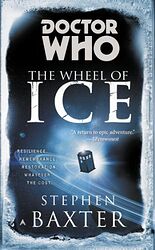
 |  |  |

 | Reviews for The Wheel of Ice |
|
 |  |  |
There are 3 reviews so far. To add a review of your own for this item, visit the voting page.
| By: | Trevor Smith, Nottingham, United Kingdom |
|
| Date: | Thursday 27 September 2012 |
|
| Rating: |   10 10 |
I came to his book having not read anything by Stephen Baxter so I didn't know what to expect other than this, the Doctor, Jamie & Zoe is my favourite TARDIS crew.
Let me say that the writer has done a damn fine job. This an excellent story that bubbles along slowly and builds into a really good climax & conclusion.
The dialogue between the Doctor & crew is spot on & you can really here the voices of Pat Throughton, Wendy Padbury & Frazier Hines coming out of the book.
The one small criticism I have is that Jamie isn't in the story enough for me.
I got a real thrill out of spotting references to old story's in his book. Like the new series they are (mostly) fleeting & if you don't know them it wound spoil your enjoyment. I spotted Talons of Weing-Cheing, Black Orchid, Evil of the Daleks, The Seeds of Death& The Silurians
All in all, a really cracking, cool book.
| By: | Earle DL Foster, Invercargill, New Zealand |
|
| Date: | Saturday 23 February 2013 |
|
| Rating: |   10 10 |
A spot-on perfect encapsulation of the Troughton era by Mr. Baxter, whose Whovian contribution surely surpasses even his not so long ago literary collaboration with Mr. Terry Pratchett. With additional information hinting that another Past Doctor Novel may be in the pipeline (presumably once again in the style of the former "Missing Adventures" range, with visible references to future notable events), this is the perfect reignition for a previously halted product selection.
| By: | David Layton, Los Angeles, United States |
|
| Date: | Wednesday 6 August 2014 |
|
| Rating: |    8 8 |
If a Doctor Who movie were made, it might be very much like this novel. Stephen Baxter is a "real" science-fiction writer, award winning and everything. That he has a soft spot for Doctor Who is apparent throughout the book. It has a loving attention to detail regarding the classic Doctor Who series, and in many ways follows the late 60s formula. At the same time, Baxter has updated some of the sensibilities. The novel itself involves the second Doctor, Jamie, and Zoe stuck because of a time anomaly late in the 21st century on a corporate-run colony mining one of Saturn's moons. Strange things are happening, and of course early on the TARDIS crew gets blamed for it, but they soon get on the right side of the good guys and become deeply involved in saving the colony from whatever menaces it. This has all the hallmarks of the classic Who, with a tightly confined setting, a base under siege plot, an officious baddie representing a large institution and making matters worse, and an apparent monster to defeat. The differences from classic Who are that the monster turns out not to be one, and that the scale on which things occur is much larger. It all would have been impossible to make in 1960s TV, and probably would be extremely hard using current TV technology. This is what gives the story a movie-plot sense. Because Baxter is a "real" science-fiction writer, this novel is probably the closest one will ever get to hard-science Doctor Who. Baxter spends quite a bit of time explaining how and why things work on Mnemosyne colony. The Whovian elements, of course, make total commitment to hard science impractical, but wherever he can, Baxter grounds his story in the scientifically plausible and has an engineer's sense of how it would all work. Though slow in parts, the novel nevertheless has an interesting plot, some good character development of the TARDIS crew, especially Zoe, and a believable space-colony community. What holds me back from giving this novel an unqualified rating are the following concerns. The first is that the officious baddie, Florian Hart, is too one-dimensional, and seems bad merely because the story requires certain plot complications. Baxter tries to give her some psychological rationale, but this is really weak and ineffective in explaining why she does what she does. Another is MMAC, the Scots robot. He becomes too cute and irritating, and again the rationale for his personality is not convincing. Finally, there is the scale of the problem. This rests on a five-billion year old piece of damaged hardware. Granted it is highly advanced hardware, but few natural things last that long, let alone any manufactured thing. These qualifications aside, "The Wheel of Ice" is a very good read and well worth getting.


